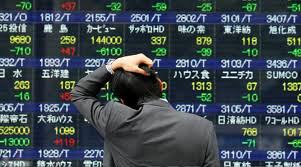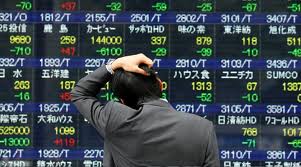
After China now it is the turn of Japan.
The economy of the ‘Country of the Rising Sun’, the third largest economy of the world, posted an output contraction of 0.4% in the first quarter of the current fiscal sending jitters waves across global markets.
This poor result is despite the huge stimulus program that the country’s Prime Minister Shinzo Abe’s put in to reverse years of poor growth.
The shrinking of the economy between April and June is attributed to the fall in private consumption and exports.
The world’s third largest economy was weighed down by weak domestic consumption and slow exports that shrank an annualized 1.6%, despite recording growths in the previous two quarters, said a Japan cabinet office note.
Despite the poor results, the primary stock market of the country, the Nikkei stock market index was up strongly by 0.6% as investors expected the government to unleash more monetary stimulus.
“Should growth remain sluggish for another quarter and inflation expectations start to fall, the odds of additional monetary easing would increase substantially,” analysts at DBS said in a commentary.
It may be recalled that China had devalued it currency thrice last week, which according to analysts, was to boost up the economy, especially exports, in the face of a slowing down of the economy.
In Japan, the private consumption fell by 0.8%. Private consumption in Japan accounts for about 60% of its GDP. Exports from the country also dropped by 4.4% in the same period.
“The sharp plunge from the previous quarter’s surprise growth was partly due to disappointing demand for Japanese products in the US, Chinese and other resource-exporting markets,” SMBC Nikko Securities said in a commentary.
“Sluggish wage growth and bad weather drove down consumption at home,” it added.
Driven by a pick up in capital spending, the first quarter economic growth in Japan had been stronger-than-expected. The second quarter results have made economists sit and up and warn that the recovery would be short-lived.
The analysts said that the Japanese economy was being hard hit by an inventory build up at Japanese firms. Japan’s revised 1.1% expansion in January-March was sharply up from an initial estimate of 0.6% growth.
Aimed to kick starting anaemic growth and conquering years of deflation, the two year old policy by the Japanese prime minister, Shinzo Abe that was nicknamed Abenomics, had found reasons for encouragement by the first quarter results. The economic blitz program included big government spending, massive central bank monetary easing and reforms to a highly regulated economy.
But of late there has been a noted slag in shaking up the protected agricultural sector. Following a sales tax rise last year, the household spending in Japan has struggled to recover. The efforts by the Bank of Japan to push up prices failed as the tumbling oil prices weighted down on commodity prices.
This oil price drop has forced a rescheduling of the proposed 2% inflation rate desired to have been achieved by thus year.
The annual growth and inflation forecasts for the fiscal year to March 2016 was earlier cut down by the central bank of Japan. Analysts are of the opinion that further monetary easing will come later this year. the Bank of Japan is expecting a economic growth of 1%this fiscal with a inflation rate of 0.7% which is significantly lower than the desired rate of 2%.
(Sources: www.reuters.com & www.ft.com)
The economy of the ‘Country of the Rising Sun’, the third largest economy of the world, posted an output contraction of 0.4% in the first quarter of the current fiscal sending jitters waves across global markets.
This poor result is despite the huge stimulus program that the country’s Prime Minister Shinzo Abe’s put in to reverse years of poor growth.
The shrinking of the economy between April and June is attributed to the fall in private consumption and exports.
The world’s third largest economy was weighed down by weak domestic consumption and slow exports that shrank an annualized 1.6%, despite recording growths in the previous two quarters, said a Japan cabinet office note.
Despite the poor results, the primary stock market of the country, the Nikkei stock market index was up strongly by 0.6% as investors expected the government to unleash more monetary stimulus.
“Should growth remain sluggish for another quarter and inflation expectations start to fall, the odds of additional monetary easing would increase substantially,” analysts at DBS said in a commentary.
It may be recalled that China had devalued it currency thrice last week, which according to analysts, was to boost up the economy, especially exports, in the face of a slowing down of the economy.
In Japan, the private consumption fell by 0.8%. Private consumption in Japan accounts for about 60% of its GDP. Exports from the country also dropped by 4.4% in the same period.
“The sharp plunge from the previous quarter’s surprise growth was partly due to disappointing demand for Japanese products in the US, Chinese and other resource-exporting markets,” SMBC Nikko Securities said in a commentary.
“Sluggish wage growth and bad weather drove down consumption at home,” it added.
Driven by a pick up in capital spending, the first quarter economic growth in Japan had been stronger-than-expected. The second quarter results have made economists sit and up and warn that the recovery would be short-lived.
The analysts said that the Japanese economy was being hard hit by an inventory build up at Japanese firms. Japan’s revised 1.1% expansion in January-March was sharply up from an initial estimate of 0.6% growth.
Aimed to kick starting anaemic growth and conquering years of deflation, the two year old policy by the Japanese prime minister, Shinzo Abe that was nicknamed Abenomics, had found reasons for encouragement by the first quarter results. The economic blitz program included big government spending, massive central bank monetary easing and reforms to a highly regulated economy.
But of late there has been a noted slag in shaking up the protected agricultural sector. Following a sales tax rise last year, the household spending in Japan has struggled to recover. The efforts by the Bank of Japan to push up prices failed as the tumbling oil prices weighted down on commodity prices.
This oil price drop has forced a rescheduling of the proposed 2% inflation rate desired to have been achieved by thus year.
The annual growth and inflation forecasts for the fiscal year to March 2016 was earlier cut down by the central bank of Japan. Analysts are of the opinion that further monetary easing will come later this year. the Bank of Japan is expecting a economic growth of 1%this fiscal with a inflation rate of 0.7% which is significantly lower than the desired rate of 2%.
(Sources: www.reuters.com & www.ft.com)





